新苏教译林版U7AUnit1 知识点总结
(完整版)译林牛津英语7A全册知识点归纳,推荐文档

let sb do sth. be nice to do sth Unit1 This is me一、词组二、句型和知识点:1、介绍自己:I am Amy. / My name is Simon.2、介绍别人:This is….3、询问别人的名字 What’s your name? 回答:I’m….. / My name is….May I know your name? Yes, I’m…Are you Mr Green? Yes I am. / Sorry. I’m Mr Brown.4、 很高兴做某事 I ’m nice / glad you. 很高兴见到你。
5、 让某人做某事 Let me see / Let’s go now. Let . 让他进来吧。
6、她长着长发。
She . = long.be good at / do well in ( doing)7、提问外貌: What is he like? / What he ?8、谈论国籍: Where you from? / Where you come from? I am from / come from China. = I am . He is from . = He from . = He is. (他是英国人)She. = She. (她来自美国。
)9、谈论出生地 – be born ---- Where you born? I in Nanjing. 10、谈论爱好:(1) like / love / enjoy doing sth(2) My hobby is playing football. (3) She is good at swimming. = She does well in dancing. = She .= She is a.注意 do well in 的否定句 例如:他不擅长跳舞。
He . 11、everyone 每个人,大家 =everybody (三单)我们班每个人都喜欢听音乐。
江苏译林版7A Unit1-8 短语和句子默写
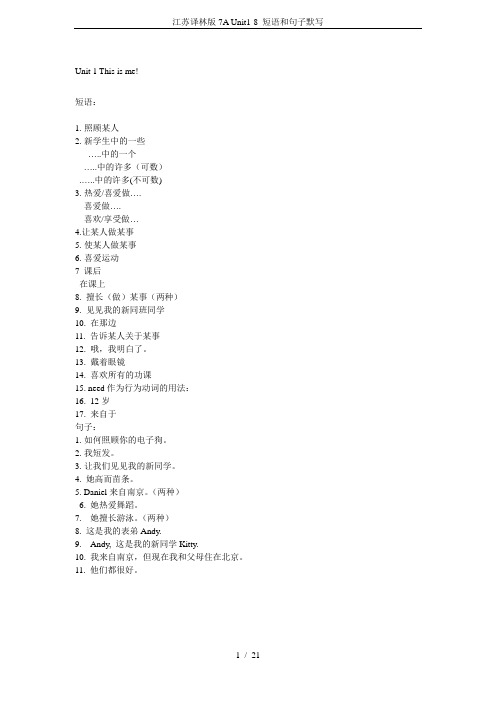
Unit 1 This is me!短语:1.照顾某人2.新学生中的一些…..中的一个…..中的许多(可数).…..中的许多(不可数)3.热爱/喜爱做….喜爱做….喜欢/享受做…4.让某人做某事5.使某人做某事6.喜爱运动7 课后在课上8. 擅长(做)某事(两种)9. 见见我的新同班同学10. 在那边11. 告诉某人关于某事12. 哦,我明白了。
13. 戴着眼镜14. 喜欢所有的功课15. need作为行为动词的用法:16. 12岁17. 来自于句子:1.如何照顾你的电子狗。
2.我短发。
3.让我们见见我的新同学。
4. 她高而苗条。
5. Daniel来自南京。
(两种)6. 她热爱舞蹈。
7. 她擅长游泳。
(两种)8. 这是我的表弟Andy.9. Andy, 这是我的新同学Kitty.10. 我来自南京,但现在我和父母住在北京。
11. 他们都很好。
Unit 2 Let’s play sports!1.做运动2.喜欢散步去散步散步3. 玩得开心(四种)4. 有空繁忙5hope的用法6. 走到我的碗边7. (梦想)实现,成为现实8. 在周末9. 当然10. 我的许多学生11. else 放在不定代词或疑问代词的什么位置别的东西别的什么,还有什么12.许多(修饰可数名词、不可数名词)一些(修饰可数名词、不可数名词)许多(修饰可数名词许多(修饰不可数名词)13.不可数名词乐趣、享乐、有趣的事多么有趣的事啊!14.谈论谈到,说到15. hero(复数)16. 一天很多次一周一次一月两次一年三次17.我最喜爱的足球队员18. 黄河足球俱乐部的一个新成员19 看起来强壮20. 足球踢得很21 在某人的空余时间里22. 喜欢听音乐23. 使某人做某事使某人……使他们开心使我悲伤24.活动25. 在电视上看球赛26. 对sometimes, often, usually, always, never, once a week, twice a month等表示频率的词或短语提问用什么27. ……怎么样?句子:1. 你有空吗?2. 你最喜欢的运动是什么?3.他也喜欢听音乐。
2024-2025学年新版+牛津译林版英语七年级上册Unit1+词汇表讲解

7A Unit 1 讲解greet/gri:t/vt.和(某人)打招呼(或问好)(7)greet sb greeting n.address: 侧重打招呼的方式或指所使用的称谓。
greet: 常指友好而热诚地欢迎。
salute: 正式用词,指用敬礼、亲吻或挥帽等动作向他人致意或问候,尤指以某种礼节欢迎某人。
welcome: 多指热情的官方的或正式的迎接或欢迎,但也指一般的欢迎。
introduce/ɪntrə'djuːs/vt.介绍introduce ... to sbintroductionself-introductioneach other/iːtʃ; / /'ʌðə/ pron. 互相(7)go by叫作,被称为(7)glad/glæd/adj.高兴(7)happy, pleasant 物pleased 人merryglad to do sthsame/seɪm/adj.同一的,相同的(7)the same as ...等同于;与…一致at the same time 同时same way 同样;同样的方法;同样的感受all the same 仍然one and the same 同一个;完全一回事as same as 和…一样for the same reason 为了同样的理由same to you 彼此彼此;我也这样祝愿你hobby/'hɒbɪ/n.业余爱好(7)hobbies 复数develop ~grade/greid/n.年级;等级(8)grade 7class: 含义广泛,指人或物按优劣划分的等级,也指学校中的年级或班级。
degree: 指程度、范围不同,社会地位的高低。
也可指形容词或副词的级。
grade: 指按地位或优劣划分的等级,既可指人又可指物。
rank: 指人在社会中的地位或等级,尤指军队中的军衔。
classmate/’kla:smeit/n.同班同学(8)-mateschoolmatedeskmate 同桌friendly/’frendli/adj.友好的(8)friend – friendlybe friendly tofriendship 友谊full/fʊl/adj.(有)大量的;满的(8)be full offull 饱的fully adv.be full of满是···的(8)be filled withenergy/'enədʒɪ/n.精力,活力(8)energetic adj. 精力充沛的energy saving 节能,能源节省solar energy 太阳能new energy 新能源energy: 用于人时,指工作时焕发出的精力或干劲。
译牛7AUnit1重点难点讲解(译林牛津版七年级英语上册教案教学设计)
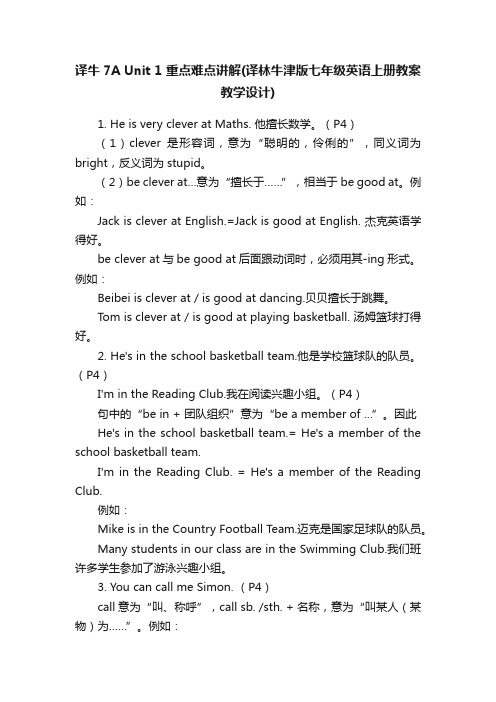
译牛7A Unit 1 重点难点讲解(译林牛津版七年级英语上册教案教学设计)1. He is very clever at Maths. 他擅长数学。
(P4)(1)clever是形容词,意为“聪明的,伶俐的”,同义词为bright,反义词为stupid。
(2)be clever at…意为“擅长于……”,相当于be good at。
例如:Jack is clever at English.=Jack is good at English. 杰克英语学得好。
be clever at与be good at后面跟动词时,必须用其-ing形式。
例如:Beibei is clever at / is good at dancing.贝贝擅长于跳舞。
Tom is clever at / is good at playing basketball. 汤姆篮球打得好。
2. He's in the school basketball team.他是学校篮球队的队员。
(P4)I'm in the Reading Club.我在阅读兴趣小组。
(P4)句中的“be in + 团队组织”意为“be a member of …”。
因此He's in the school basketball team.= He's a member of the school basketball team.I'm in the Reading Club. = He's a member of the Reading Club.例如:Mike is in the Country Football Team.迈克是国家足球队的队员。
Many students in our class are in the Swimming Club.我们班许多学生参加了游泳兴趣小组。
3. You can call me Simon. (P4)call意为“叫、称呼”,call sb. /sth. + 名称,意为“叫某人(某物)为……”。
7a_Unit1苏教版,译林版牛津英语7A,7a上,七年级上册Unit_1课件及习题
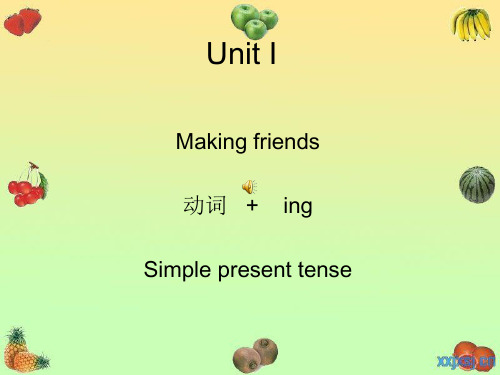
Yes,
I No, .you/ they .he/ she/ it
.do not. .do not. .don’t. .does not. .doesn’t.
How to add “s”, “es” to the verbs Most verb +s Verb ending in a consonant +y -y, +ies Verbs ending in ss, ch, sh or x Verbs ending in o Look → looks Play → plays Love → loves Fly → flies Study →studies Miss → misses Watch →watches Go → goes Do → does
Part two
动词 + ing
V+Ing
• 喜欢做某事
• 去做某事
• 擅长做某事
目前我们所学的动词+ing 的用法 一. 喜欢做某事 like/ love/ enjoy doing sth
e.g. 1.Daniel likes playing computer games Daniel 喜欢打电脑游戏 2.Simon doesn’t love swimming 西门不酷爱游泳 3.Does Mille enjoy listening to music? Mille 喜欢听音乐吗?
+es +es
Practice makes perfect
Model : I like fish. (meat) I don’t like meat. 1. His brother plays football after school (basketball) _______________________________________ It looks like a cat. (hat) _______________________________________ She has a dog at home. (cat) _______________________________________
译林版英语七年级上册7Aunit1知识点

译林版英语七年级上册7Aunit1知识点7A Unit1 知识归纳与拓展【词汇解析】1.gradegrade作名词,意为“年级”。
指年级时,多以短语形式出现:“Grade+基数词”,首字母要大写。
如:八年级Grade Eight/Grade 8。
也可用“the+序数词+grade”。
另外,grade还有“成绩”的意思。
M y brother is in Grade Two.=My brother is in the second grade.我弟弟上二年级。
All the students get good grades.所有的学生都获得了好成绩。
2.be good at(doing)sth.be good at(doing)sth.意为“擅长(做)某事”。
at是介词,后接名词或动词一ing形式。
Is your sister good at:dancing? 你姐姐擅长跳舞吗?3.swimmingswimming作名词,意为“游泳;游泳运动”。
其构成是由动词swim双写最后一个辅音字母,然后加上后缀一ing变来的。
许多动词都可以变成一ing形式作名词使用。
Tom likes running.汤姆喜欢跑步。
Jerry and Mary like singing.杰瑞和玛丽喜欢唱歌。
Reading is good for students.阅读对学生们有益。
4.ageage为名词,意思是“年龄”,如果指多少岁,可以用“基数词+year(s)+old”。
His age is 12.他12岁了。
He is twelve years old.他12岁了。
What is the age of the bridge? 这座桥有多久的历史了?5.everyoneeveryone为代词,意为“每人,人人”,作主语时,谓语动词必须用单数形式。
everyone 是一个词,只用来指人,后面不能跟介词of;every one是两个词,既可用来指人,也可用来指物,后面可跟介词of。
Unit1单词解析牛津译林版七年级英语上册
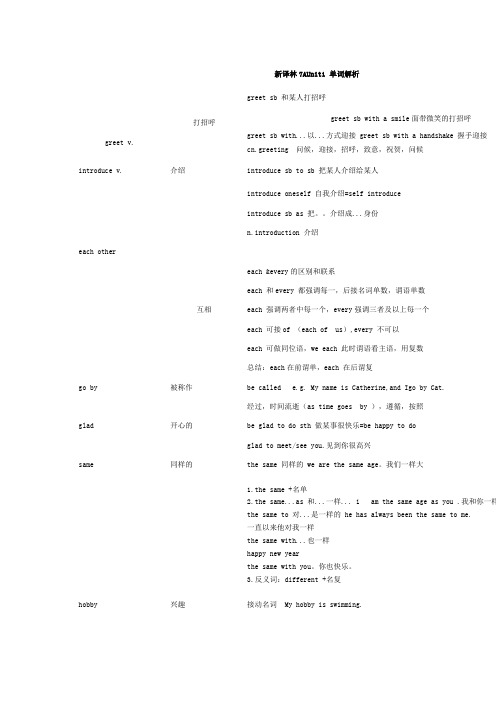
新译林7AUnit1 单词解析打招呼greet sb 和某人打招呼greet sb with a smile面带微笑的打招呼greet v. greet sb with...以...方式迎接 greet sb with a handshake 握手迎接cn.greeting 问候,迎接,招呼,致意,祝贺,问候introduce v. 介绍introduce sb to sb 把某人介绍给某人introduce oneself 自我介绍=self introduceintroduce sb as 把。
介绍成...身份n.introduction 介绍each other互相each &every的区别和联系each 和every 都强调每一,后接名词单数,谓语单数each 强调两者中每一个,every强调三者及以上每一个each 可接of (each of us),every 不可以each 可做同位语,we each 此时谓语看主语,用复数总结:each在前谓单,each 在后谓复go by 被称作be called e.g. My name is Catherine,and Igo by Cat.经过,时间流逝(as time goes by ),遵循,按照glad 开心的be glad to do sth 做某事很快乐=be happy to doglad to meet/see you.见到你很高兴same 同样的the same 同样的 we are the same age。
我们一样大1.the same +名单2.the same...as 和...一样... i am the same age as you .我和你一样the same to 对...是一样的 he has always been the same to me.一直以来他对我一样the same with...也一样happy new yearthe same with you。
译林牛津7a1-8知识点
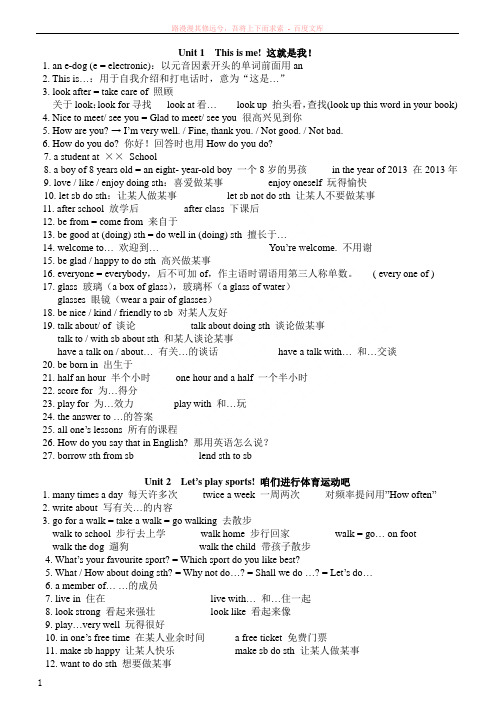
Unit 1 This is me! 这就是我!1. an e-dog (e = electronic):以元音因素开头的单词前面用an2. This is…:用于自我介绍和打电话时,意为“这是…”3. look after = take care of 照顾关于look:look for寻找look at看…look up 抬头看,查找(look up this word in your book)4. Nice to meet/ see you = Glad to meet/ see you 很高兴见到你5. How are you? → I’m very well. / Fine, thank you. / Not good. / Not bad.6. How do you do? 你好!回答时也用How do you do?7. a student at ××School8. a boy of 8 years old = an eight- year-old boy 一个8岁的男孩in the year of 2013 在2013年9. love / like / enjoy doing sth:喜爱做某事enjoy oneself 玩得愉快10. let sb do sth:让某人做某事let sb not do sth 让某人不要做某事11. after school 放学后after class 下课后12. be from = come from 来自于13. be good at (doing) sth = do well in (doing) sth 擅长于…14. w elcome to… 欢迎到… You’re welcome. 不用谢15. be glad / happy to do sth 高兴做某事16. everyone = everybody,后不可加of,作主语时谓语用第三人称单数。
- 1、下载文档前请自行甄别文档内容的完整性,平台不提供额外的编辑、内容补充、找答案等附加服务。
- 2、"仅部分预览"的文档,不可在线预览部分如存在完整性等问题,可反馈申请退款(可完整预览的文档不适用该条件!)。
- 3、如文档侵犯您的权益,请联系客服反馈,我们会尽快为您处理(人工客服工作时间:9:00-18:30)。
7A Unit 1 This is me
知识点复习
1、e-dog 电子狗
2、master 主人(be) one’s master (是)某人/物的主人
3、look after =take care of…照顾
look after sb.well… take good care of… 把某人照顾得好
4、welcome (to) sp.欢迎来到… 当副词遇到to,to要省略
5、in C lass 1, G rade 7 在7年级1班
6、love /enjoy/like doing sth 喜爱做某事
7、the R eading C lub 阅读俱乐部
8、be born in sp在..地方出生was/were born一般用过去时
9、live in Beijing 住在北京live with sb 与某人住在一起
10、after school 放学after class 下课
11、one cousin 一个表兄\弟\姐\妹
12、come from=be from 来自
13、have long black hair 有黑的、长的头发
14、listen to music [u] 不可数喜欢听音乐
15、let sb do 让某人做某事
16、work hard 工作/学习努力study hard 学习努力
16、be good at sth./ doing sth. =do well in sth./doing sth.擅长做某事
17、funny=interesting 有趣的,搞笑的
18、wear glasses 戴眼镜 a pair of glasses 一副眼镜
19、play computer games 玩电脑游戏
20、polite helpful (adj) 有礼貌的,乐于助人的
21、hobby可数名词→hobbies 爱好
one’s(形物)hobby is doing sth. 某人的爱好是做某事
23、volleyball 排球
24、swimming 游泳→in a swiming pool
25、badminton 羽毛球→on the badminton court
26、football 足球→on the football field
27、table tennis 乒乓球
28、be like像介词like喜欢动词
29、take one’s dog for a walk
walk the dog 遛狗
30、talk to sb.=talk with sb. 与某人谈话
31、walk home home是adv前面to省略
walk to sp.=go to sp. on foot
walk to school (to不能省)
32、take the bus to sp.=go to sp. by bus. 坐公交车去某地
33、at the weekend=at weekends 在周末
34、for half an hour for+一段时间
35、watch the games 观看游戏、比赛【c】
36、sometimes (adv)有时
37、fly the kite=fly kites 放风筝可数名词一定要加冠词
38、at my grandparents’ home 在我祖父母家
39、in a restaurant [c] 在一家餐厅
40、after going running 介词后面跟动词的ing形式
41、player 运动员
42、play for+球队=be a member of+球队=be in+球队为…效力
43、score V.=score a goal=score goals 进球得分
44、match=game【u】比赛
45、the W orld C up 世界杯
46、one's (形物) favourite sth. is…=sb like sth best
某人最喜欢的...是…
47、sport s news 【u】体育新闻
48、the newest member 最新的成员
49、birthplace 出生地
50、look+adj 系动词看上去....样
51、win again 再次赢得比赛
52、borrow 借进
borrow sth from sb. 从某人那里借来某物
lend 借出
lend sth. to sb. 把某物借给某人
53、How do you say sth. in English?=What's this/that in English? 用英语怎么
说?
54、understard V. 理解,明白
55、the answer to sth. ......的答案
the answer to the question问题的答案
56、all your friends 全部,所有adv 都(两者以上)
57、all come from=be all from 都来自
58、different Clubs 不同的俱乐部
59、Sound great adj 听起来不错
60、Fish [u] 鱼肉、种类、条数
61、be helpful to sb. 对某人怎么样
be nice to do sb.
be friendly to sb.
62、begin/start to do/doing sth 开始做某事
63、Want to do sth. =would like to do 想要做某事
64、all one's(形物) sth. 某人所有的东西
65、this pair of glasses
this pair of trousers 动词看pair的单复数
67、使用一般现在时的情况:
(1)目前真实存在的事
(2)定期经常做的事
(3)客观永远存在的事实真理或科学规律
68、实义动词/行为→表示动作或行为的词,有实在的意义。
注意:句子中须有be动词或实义动词原型,但不可同时出现。
69、1、在adj前(be+adj)
2、在名词前(be+名词)
3、在介词前(be+介词短语)
4、在一些固定短语中be good at, be born,
70、特殊疑问句wh开头(特殊疑问词)
1、How针对adj、adv 提问
2、对there be句型划线部分提问,用What's+地点?
3、对主语提问,谓语动词用三单形式
4、there be+名词be动词单复数要遵守就近原则
5、动词的ing形式作主语,后面动词要用单数形式
71、当主语是第三人称三单单数(三单),动词要用三单
动词变三单的三种情况:
1、直接加s
2、以辅音结尾加y,去y+ies 注:stay→stays
3、以s、x、ch、sh、o结尾加es
72、句中有行为动词时,否定句和疑问句必须用助动词do或does句中助
动词do或does时,句中行为动词必须还原成原型。
73、How well do you know sth./sb.?
你有多了解某物/某人?
I know very well.
I don't know...well.
74、go swimming/running/jogging 去做..运动
75、dark brown eyes 深棕色的眼睛
审题要求:1、一句话中只能有一个动词(be或者行为动词)
2、看人称(单复数形式)注意三单
3、可数名词(加冠词an/a/the或变复数)。
